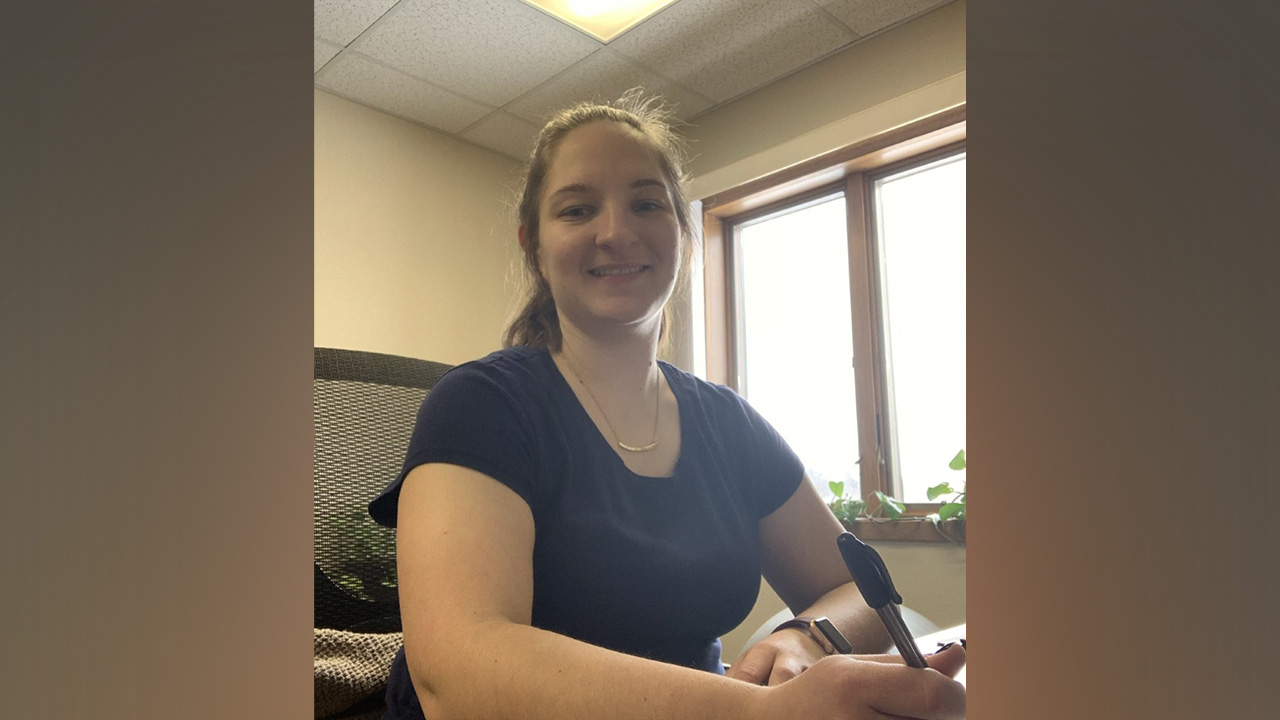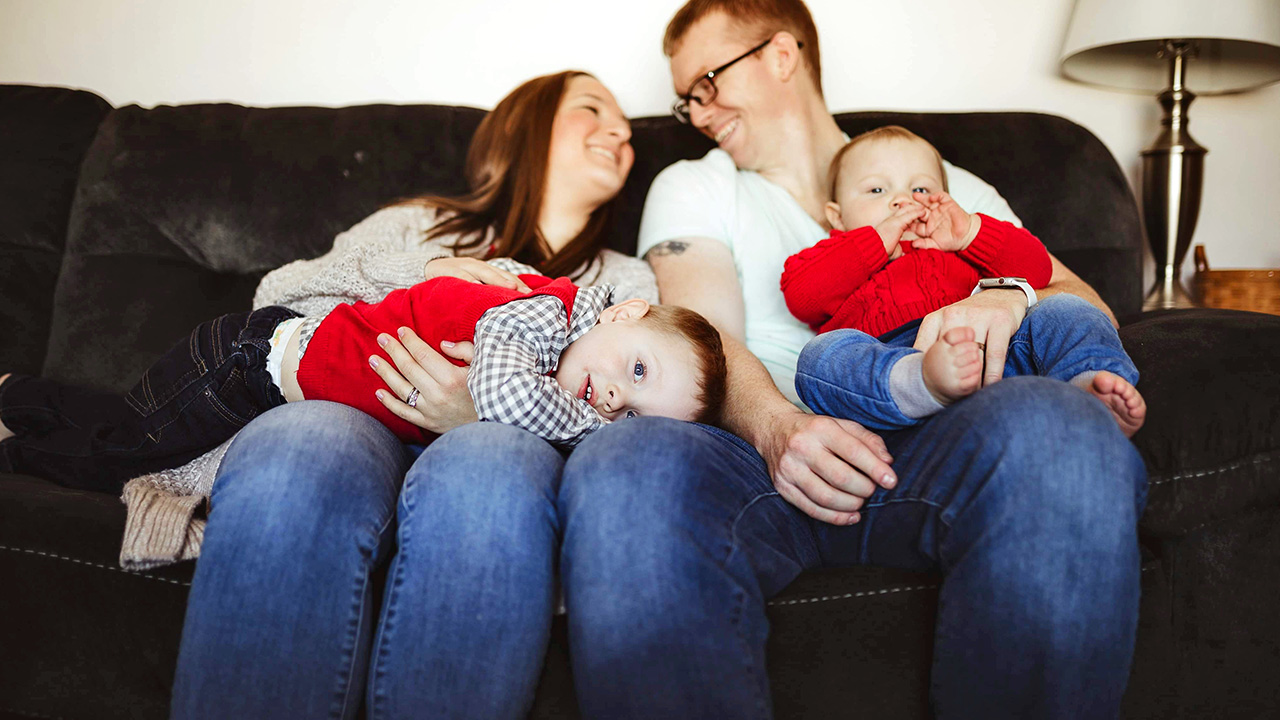


During the COVID-19 crisis, University of Wisconsin-Platteville alumni who provide critical services and resources to those in need have risen to the challenge by adapting and innovating new ways of staying connected with their clients in ways that meet safer-at-home guidelines. To do so, they often draw upon their education and experiences at UW-Platteville.
One alumna who has found a different way to continue to serve her clients is Kayzia (Whiteaker) Teal, who earned a Bachelor of Science in psychology and a minor in sociology from UW-Platteville in May 2016, in three years. After earning a Master of Social Work from St. Ambrose University in Davenport, Iowa, in May 2019, she returned to her hometown of Janesville, Wisconsin, to be closer to family.
Currently, Teal is an emergency services coordinator at Unified Community Services, working primarily out of its Dodgeville, Wisconsin office. The organization provides programs in mental health, substance abuse, community support, birth-to-three, children’s long-term support, family support, emergency services and more.
In her position, Teal provides crisis intervention services and assessments for those in crisis. One day per week, she also provides outpatient mental health therapy and substance abuse counseling.
“One of the biggest rewards of my job is knowing I may be the only positive interaction my clients have that day, that week or that month,” she said. “One of the biggest challenges is lack of resources for the clients I am serving.”
Impact of COVID-19
The COVID-19 crisis has impacted Teal professionally by making it necessary for her to provide mental health-related services via telehealth.
Prior to COVID-19, Teal communicated with clients who needed crisis intervention services by phone or met with them in the Dodgeville office. She also completed assessments by phone or in the local hospital’s emergency rooms as needed. After initial contacts with clients, she followed up with them again to assess for any additional needs and to provide contact information to resources within the area. She met with her outpatient therapy clients at the Dodgeville office too.
When COVID-19 hit, Teal adapted and began using telehealth, which allows her to see her outpatient clients and facilitate therapy sessions over video. She also uses telehealth for crisis assessments if clients present to the Dodgeville or Lancaster offices. If clients do not have internet access, she conducts telehealth over the phone.
“Transitioning to telehealth has been relatively easy, but it has had an impact on clients,” she said. “Providing therapy through telehealth is challenging because you are not physically with the client, and a lot of clients struggle with social isolation and lack of social support. I have noticed my clients talking more about feelings of loneliness. The face-to-face interaction is what I miss most.”
COVID-19 has also impacted Teal personally.
“The pandemic has caused me to feel fear and concern that I could get my family and loved ones sick due to my being an ‘essential employee,’” she said. “Some of that fear and concern has decreased with my ability to work remotely and to provide my services to clients via telehealth, but I still have concern every time I have to go shopping for groceries or other basic needs.”
Although the past few weeks have been difficult, Teal has adapted to the “new normal,” and remains focused on what she has always believed is most important: taking care of herself and her family and providing critical resources and support to those in crisis or in need.
UW-Platteville experience
Teal said her education and experiences at UW-Platteville enabled her to gain critical skills that have helped her handle the COVID-19 crisis and other difficult times.
“I think about the time I spent at UW-Platteville and when I had just started my degree,” she said. “I knew no one, other than my sister, and felt alone and isolated. I got involved in the activities on campus to meet new people, try new things and have social interaction. By doing this, I learned there is never just one way to interact with others. You just have to find the best way for you.
“My education at UW-Platteville helped me develop critical thinking and problem-solving skills that I use every day in my job, especially now, as I try to navigate how to best provide services to my clients. I am thankful for how well my general studies and psychology coursework prepared me for graduate school and my career in social work.”
Teal was inspired to pursue the field of psychology after volunteering with St. Croix Hospice, formerly St. Jude Hospice, in Platteville, her freshman year, when she was a biology major. As a volunteer, she provided support to clients and their families, including talking, doing puzzles, reading books, listening to music, etc.
“When I was volunteering with hospice, I fell in love with the direct care and working with individuals,” she said. “After having a conversation with my father, I decided to switch majors, and have been blessed with a career I love.”
When asked what she loved most about her education at UW-Platteville, she said, “how personally and closely I was able to work with the professors to learn what my strengths and weaknesses were, in addition to what I was passionate about.”
She expressed gratitude for her professors for providing her with mentoring, support and encouragement. “My professors got to know who I was, as a person, and encouraged me to do more because they believed I could,” she said.
“It’s students like Kayzia who make us love teaching at UW-Platteville,” said Dr. Elizabeth Gates, chair of the Department of Psychology at UW-Platteville. “She took advantage of every educational opportunity available to her and always had a positive attitude, even when life was very challenging for her.”
Teal noted that UW-Platteville’s small class sizes and personal setting benefited her too.
“I am a very hands-on learner, so lecture classes where it’s more difficult to ask questions are hard for me,” she said. “The small classes and knowing my professor gave me the opportunity to ask as many questions as I needed to be successful.”
Teal participated in several hands-on learning opportunities that had a deep impact on her, including the Ecology and Landscapes field trip and an independent study in Argentina.
She also participated in a semester-long internship at Opening Doors’ Teresa Shelter in Dubuque, Iowa, which offers emergency and extended stay services to women and children experiencing homelessness. As an intern, she was responsible for supporting the women at the shelter, providing guidance, and enforcing some of the rules.
“I learned a lot from each of these unique experiences,” said Teal. “During the ELF trip, I travelled to Oregon, saw the Pacific Ocean and Cascade Mountains, and studied the ecology and geomorphology of the region. During the independent study in Argentina, I interviewed young adults to assess cultural similarities and cultural differences in gender norms. And during the internship at Opening Doors, I learned about the cycle of homelessness.”
Teal said she experienced, firsthand, many of the benefits of pursuing an education at a small, rural university.
“I was able to get real-life examples, with the ability to go out into the workplace to experience them through internship,” she said. “Although my internship at the Teresa Shelter was not the specific area I wanted to pursue after graduation, it gave me the ability to see what I did like and what I didn’t like. It also helped shape the path of me getting my master’s degree.”
Teal said her education at UW-Platteville clearly helped prepare her for her future career.
“My education showed me diversity and gave me a foundation of knowledge to support my furthered education,” she said. “Many days, I still go back the basics of psychology that I learned at UW-Platteville to do an assessment.”
Teal said she also appreciated the affordability of UW-Platteville compared to other higher education institutions.
“My family’s situation growing up made it hard for me to go to college because of financial barriers, but because I was resilient and had a support system in place, I was able to attend UW-Platteville at an affordable price,” she said. “This gave me insight into some of the challenges that my current clients face and allows me to never take anything for granted.”
In April 2017, when Teal was still a student at UW-Platteville, her family was featured in the book "Janesville: An American Story" by Amy Goldstein. The book explores individuals and families who were directly impacted by the General Motors closing in Janesville, Wisconsin.
“I personally have not read the book because I am not ready to relive that time in my life,” said Teal. “One day maybe, but not right now. I am a very open person, and I believe that my transparency about certain feelings and topics is a way for me to share and tell people it’s okay to struggle and one day you may be able to move on. Today just may not be that day.”
Teal offers tips on how to cope, stay connected during COVID-19
Teal shared some of the tips she gives her clients and others on how to cope and stay connected during COVID-19 and other difficult times.
“One way to stay connected with others is reaching out by phone, email, social media or even writing a letter to loved ones and friends,” she said. “If you can, talk with your family members and use them as supports.”
“One way to cope is to find things you can do just to stay busy, such as walking, reading, listening to music, watching a movie and playing with your pet,” she said. “Personally, I am trying to maintain a regular routine, just for consistency and normalcy, and by doing this, the isolation and time spent at home has been easier.”
Teal said if someone is in crisis and their coping skills are not working, they should reach out to professionals.
“There are national crisis lines and local crisis lines that have trained professionals that can help you,” she said. “If you need resources, there are always local organizations that can help point you in the right direct to get you the things you need.”
Importance of helping others
Teal also stressed the importance of helping others, in a safe way, especially those in crisis or in need.
“Remember to help others and be kind,” she said. “If there is a neighbor who needs a meal and you are able to help, do so. If someone is out of toilet paper and you have more than enough for yourself and your family, give them a roll or two. Small acts of kindness mean so much and can make a huge impact on someone’s life.
Teal said that each day, she is inspired by her children and her husband.
“My kids are young and always put something in perspective that I would not look at or think about in a certain way,” she said. “Additionally, my husband has been my biggest supporter and shows me, through his own resiliency, that even when times get hard, you always have the strength to keep going.”
As she looks ahead, Teal hopes to continue helping others.
“I hope to help others by showing them that no one has to struggle alone,” she said. “If I cannot help someone directly, I want to be the support who helps guide others who can help them.”